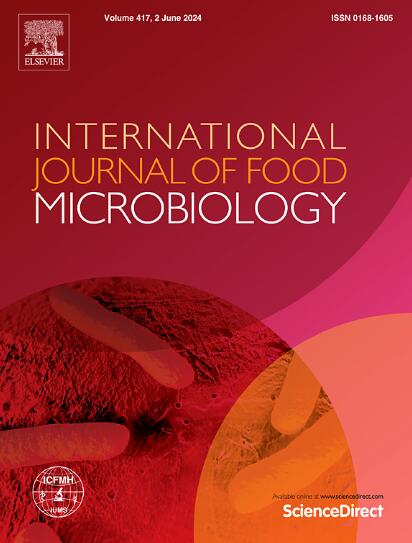Adaptation of bacterial starter cultures from dairy to plant-based substrates: challenges and opportunities
IF 5
1区 农林科学
Q1 FOOD SCIENCE & TECHNOLOGY
International journal of food microbiology
Pub Date : 2025-06-06
DOI:10.1016/j.ijfoodmicro.2025.111304
引用次数: 0
Abstract
The global market for plant-based milk alternatives (PBMA) is expanding with an increasing demand for sustainable plant-based products which offer similar nutritional and organoleptic properties to that of their dairy counterparts. These PBMAs are largely derived from legumes, seeds, nuts, cereals and pseudocereals. Lactic Acid Bacteria (LAB) are central to food fermentations wherein their metabolic activities contribute to the preservation, safety and organoleptic properties of a product. The biological pathways which underpin dairy fermentations have long been elucidated and exploited. However, it is now evident that many of the biotechnological traits which drive dairy fermentations, in particular casein hydrolysis and lactose utilisation, are not directly transferable to PMBA-substrates. Therefore, knowledge of the carbohydrate and protein composition and their metabolism by the applied starter cultures is required for the development of high quality fermented PBMA dairy analogues. Here, we review the fundamental traits that lactic acid bacteria should possess for the fermentation of varied PBMA substrates, with a particular focus on carbohydrate utilisation and protease activity. Firstly, we consider the genetic limitations of those dairy-adapted and industrialised starter strains which may prevent their successful application to PBMA fermentations. Secondly, we consider the genetic and bio-functional activities of both plant-associated and non-starter LAB and reveal their potential as starter cultures for the emerging PBMA fermentation industry.
By understanding the genetic and metabolic requirements food producers will be afforded the opportunity to design the next generation of defined, rotational starter sets, which harbour the bio-specific traits required for the fermentation of PBMA substrates.
从乳制品到植物基基质的细菌发酵剂的适应:挑战和机遇
全球植物性牛奶替代品(PBMA)市场正在扩大,对可持续植物性产品的需求不断增加,这些产品提供与乳制品相似的营养和感官特性。这些pbma主要来源于豆类、种子、坚果、谷物和假谷物。乳酸菌(LAB)是食品发酵的核心,其代谢活动有助于产品的保存,安全性和感官特性。支撑乳制品发酵的生物学途径早已被阐明和开发。然而,现在很明显,许多驱动乳制品发酵的生物技术特性,特别是酪蛋白水解和乳糖利用,并不能直接转移到pmba底物上。因此,通过应用发酵剂了解碳水化合物和蛋白质组成及其代谢是开发高质量发酵PBMA乳制品类似物所必需的。在这里,我们回顾了乳酸菌在发酵各种PBMA底物时应该具备的基本特征,特别关注碳水化合物利用和蛋白酶活性。首先,我们考虑了那些适应乳制品和工业化的发酵剂菌株的遗传限制,这可能会阻碍它们成功应用于PBMA发酵。其次,我们考虑了植物相关和非发酵剂的遗传和生物功能活性,并揭示了它们作为新兴PBMA发酵工业发酵剂的潜力。通过了解遗传和代谢要求,食品生产商将有机会设计下一代定义的旋转启动器,其中包含发酵PBMA底物所需的生物特异性特性。
本文章由计算机程序翻译,如有差异,请以英文原文为准。
求助全文
约1分钟内获得全文
求助全文
来源期刊
CiteScore
10.40
自引率
5.60%
发文量
322
审稿时长
65 days
期刊介绍:
The International Journal of Food Microbiology publishes papers dealing with all aspects of food microbiology. Articles must present information that is novel, has high impact and interest, and is of high scientific quality. They should provide scientific or technological advancement in the specific field of interest of the journal and enhance its strong international reputation. Preliminary or confirmatory results as well as contributions not strictly related to food microbiology will not be considered for publication.

 求助内容:
求助内容: 应助结果提醒方式:
应助结果提醒方式:


